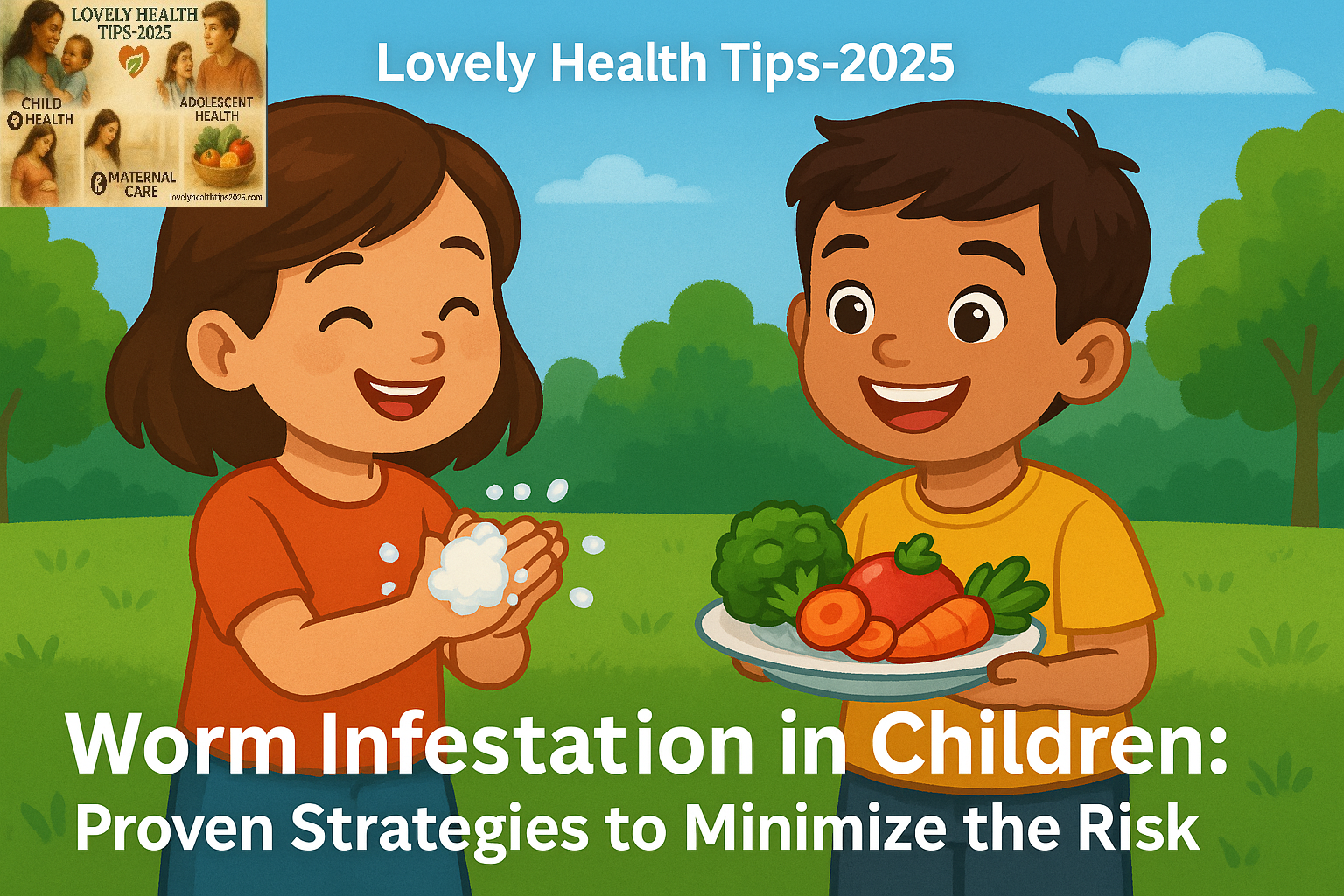Last Updated on October 21, 2025 by
Worm Infestation in children: Worms are parasites that live by sucking us so they actually harden with your gut (the way that they are as a whole attacking your mpeg, and smoking their entrapment legitimately can wash them).Failure to treat these worms (roundworms, tapeworms, hookworms and pin-worms) results in multiple health problems for patients. There are three types of worms that can infest children — round worms, hook worms, pin worms and whip-worms. Intestinal parasites are some of the most common infections among children, especially those living in areas with inadequate hygiene and sanitation.
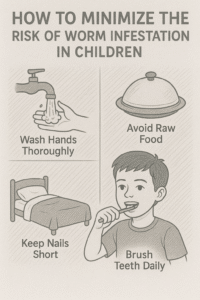
How do worms spread & risk of worm infestation in children increases?
- Unsanitary and unhygienic circumstances lead to worm diseases.
- Worms are contagious and come in contact with dirty soil.
Common Behaviors in the rural Community for Worm Infestation in children
- Playing at outside field with barefoot.
- Not-washing hands before consuming any type of food.
- Having an open bowel movement.
- Hands failing to be washed after visiting the washroom
- Eating requiring no cleaning of fruits and vegetables.
- Food contamination could occur if food is not covered.
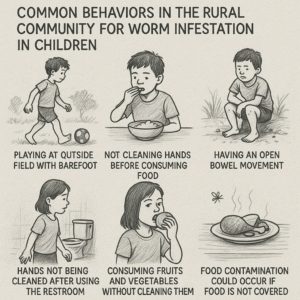
Symptoms of Worm Infestation in children :
- The intensity is the symptoms of an infected person worsening as the number of worms in the child increases.
- Signs of serious infections can include weakness, loss of appetite, diarrhea and abdominal pain.
- Milder infections in children usually have no symptoms.
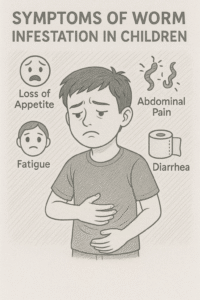
Types of Worm :
- Hook Worm
- Whip Worm
- Round Worm
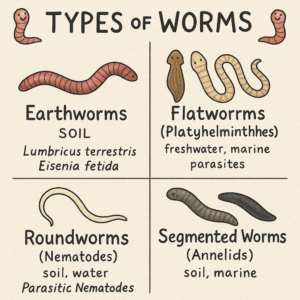
Worm Transmission Cycle : Worm Infestation in children
1. A child with the infection contaminates soil with worm egg-containing feces. Hatching process continues in the soil and then, larvae formed from eggs.
2. Other kids get infected by larvae that pierce the skin or by eggs that are consumed through food or contaminated hands.
3. In a youngster with the infection, eggs and larvae grow into adult worms that lay eggs and negatively impact the child's health.
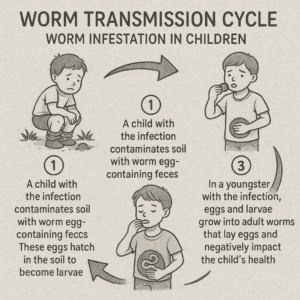
Preventing Worm Infection in children :
- Clean, short and neat hand nails should be standard.
- We should ensure that our environment is neat & clean always.
- Always consume pure water.
- Food should be kept covered.
- Rinse all your fruits and vegetables with clean water just before taking or cooking them.
- Soap hand-washing should be performed before eating along with after using the toilet.
- Don’t urinate outside. Always use the restroom.
- Wear any protective footwear such as shoes or slippers.
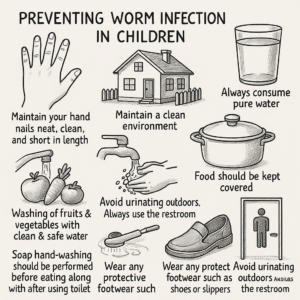
Benefits of De-worming :
In children, worm infestations in children bring a Direct Benefit:
- Manages anemia by de-worming on regular intervals.
- Incorporating it is useful in bringing more valuable nutrients into your body
Indirect-Benefit:
- Immunity power increases
- Makes students focus more, allow them to learn and stick to school and Anganwadi visits.
- The improvement of job opportunities along with employment means become more achievable
- Because the prevention cycle works, the number of worm infections in the population goes down.
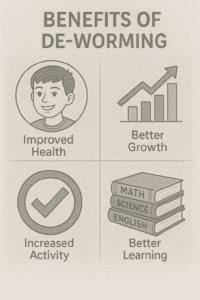
Treatment for Worm Infestation in children
Worm infestations are usually treated with prescribed Anti- Parasitic medications
The healing process for worm infections becomes faster when patients join dietary treatment programs and maintain hygiene habits together with their prescribed medications.
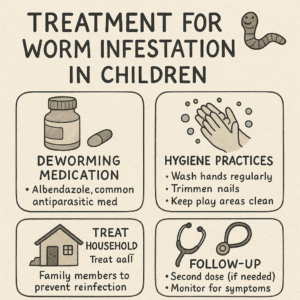
Conclusion for Worm Infestation in children
Proper treatment of worm infections should happen at the first signs of infection to prevent serious health problems. If people keep clean, eat safely and de-worm frequently, worm infections are less likely. If symptoms continue, one should always consult with a doctor for the same for worm infestation in children.
FAQs:
Q1. Why do worm infestations occur on children?
Ans. A worm infestation happens when kids do not wash themselves well, eat or drink contaminated substances or touch surfaces contaminated with soil. The most common worms infecting humans are roundworms together with hookworms and tapeworms.
Q2. How can you tell if your child might have a worm infection?
Ans. Your child may present stomach pain as well as diarrhea and weight loss and experience itching near the anus and possibly they will see worms appearing in their stool or become irritable. Not all infected children will display noticeable symptoms of Worm Infestation in children.
Q3. My child can reduce worm infections through which preventive actions?
Ans. Handwashing should be a regular practice while food needs proper cooking along with appropriate nail trimming for the fingernails and wearing shoes during outdoor activities. When receiving pediatrician recommendation children should undergo regular deworming protocols.
Q4. How frequently are medical professionals recommending that kids be given worm medication?
Ans. Child deworming should be administered one or two times annually according to the World Health Organization especially for children living in places with high worm infection rates. Salvage professional guidance from your child’s doctor when seeking guidance for Worm Infestation in children.
Q5. Does food intake provide children any natural protection against worm infections?
Ans. The gut health of children improves when they consume fiber-rich foods together with yogurt as a probiotic source and include garlic and papaya and pumpkin seeds as small part of their diet.
Q6. Parents need to know whether worming medications are safe to administer to their children.
Ans. A worm infestation happens when kids do not wash themselves well, eat or drink contaminated substances or touch surfaces contaminated with soil. People should follow the prescriptions by a doctor.
Q7. Worm infestations have the potential to disrupt a child’s physical development together with their growth.
Ans. Nutritional deficiencies due to persistent worm infections may lead to anemia, slow growth and brain changes if the problem is not resolved with medicine on time.
Q8. If one child has worms must healthcare professionals also give treatment to the rest of the family members?
Ans. Doctors often advise treating all household members following the diagnosis of worm infection because repetition of infections is likely due to inadequate hygiene practices for Worm Infestation in children.
Q9. Environmental hygiene plays what role in stopping the spread of worm infestation?
Ans. Very important. Improper living space cleanliness and unsafe drinking water coupled with inadequate facilities for sanitation will raise health risks for everyone.
Guideline of WHO for Deworming and its link as mentioned below: https://www.who.int/tools/elena/interventions/deworming
Thanks and Regards
About the Author – “Mr. Bibhu Ranjan Mund”, Master in Public Health (MPH) from IIHMR University, Jaipur (Rajasthan) has experience of 18 years in Public Health activities. Through “Lovely Health Tips-2025”, we share the evidence & experienced based health & wellness guides with solutions for every day well-being. More from Author
Disclaimer
This information is suggestive only and not a replacement for medical advice. For more detail, please visit to my website as mentioned below:

